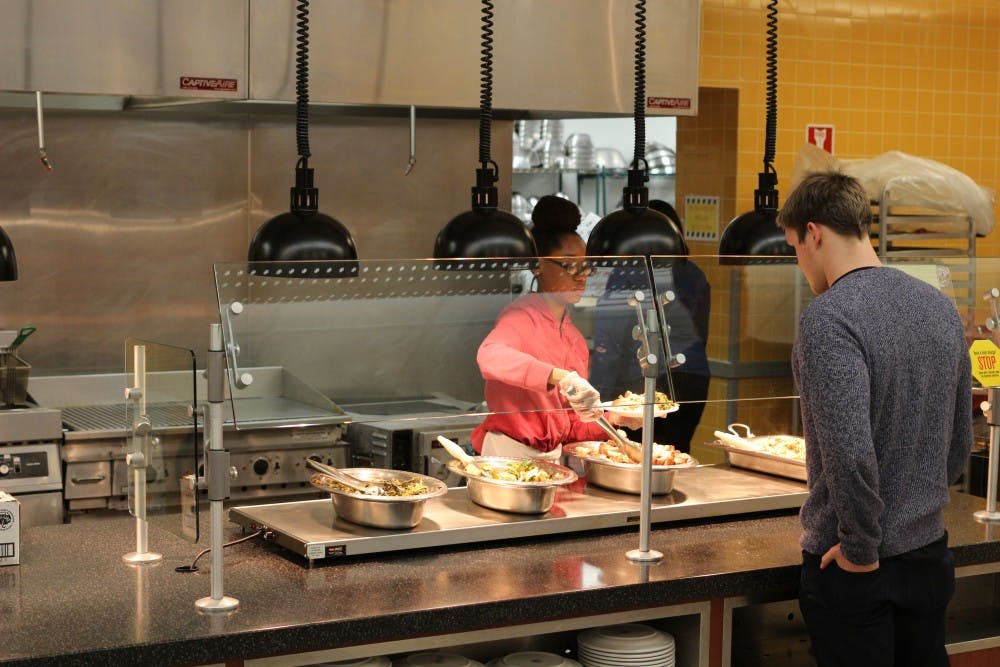
“Vegan,” “vegetarian,” “made without gluten-containing ingredients” — with all these labels and more, Bon Appétit tries to help students with severe allergies and dietary restrictions navigate dining facilities.
Students who are required to have a meal plan their first year might worry about safety of food in dining halls. In August 2014, College sophomore Victoria Greene was hospitalized after eating food in a dining hall she thought was allergen-free, but actually contained dairy, to which she is severely allergic. But Bon Appétit says they are willing to go to great lengths to accommodate students with special dietary needs, though it relies on students to reach out for help.
When students first register for a dining plan online, there is an option to self-identify as someone with a dietary need or concern. Students can list their allergies, deficiencies or dietary preferences like vegetarian or vegan.
This information is forwarded to Bon Appétit dietitian Dan Connolly, who tries to get into contact with them. However, student response rate is generally only 25 percent, he said.
For students who respond and want to meet to talk about their dietary concerns, Connolly sits down with students individually and arranges meetings between students and dining facility chefs.
“I explain to them how to decipher the core icons we use, how to go through our menus and understand what ingredients are in each item being served and reassure them and their parents that all of [Bon Appétit’s] staff is trained and knowledgeable about allergies and cross-contamination,” Connolly said.
For most of the students Connolly meets with, the offerings dining halls already have are sufficient for their needs, he added.
Individual plans are developed for students, and students normally work with a particular chef at the dining hall they want to frequent the most.
“My first goal is to make sure the students are comfortable to come in,” Executive Chef at Hill College House Donald Stauffer said. “They generally let me know when they’ll be coming in to eat, and I get to know their class schedule a bit.”
Chefs and their staff do personalized cooking for students with allergies to prevent any cross-contamination, and they try to have the meal ready for when the student would normally come in to eat. Separate pans are used for gluten-free and each major allergy, and lists of students who need individual attention are kept behind the kitchen so that all the employees can be better aware of who they’re cooking for.
“Though we normally have food already out that the students with allergies could eat, we want to take the necessary precautions and let the students feel safe and comfortable when they have our food,” Stauffer said.
Some of Stauffer’s staff at Hill have gotten particularly close with the students with allergies. “A cook was really close with one of the students who he worked with, so when she was sick one night and didn’t feel well enough to come down for dinner, he walked her meals upstairs for her until she felt better,” Stauffer said.
The goal is to make the interaction with chefs convenient and prevent it from being awkward, Stauffer added. Allergen-free food is cooked beforehand so that students who suffer from allergies don’t need to wait any longer than those who don’t.
Beyond working with students who require special dietary attention, Bon Appétit and Penn Dining want to hear feedback and recommendations from their consumers.
“We want to talk about the food. We want to have feedback. Students just have to realize that they can talk to chefs and request what they want or ask about anything,” Connolly said. “We want to hear from all students from the beginning.”
The Daily Pennsylvanian is an independent, student-run newspaper. Please consider making a donation to support the coverage that shapes the University. Your generosity ensures a future of strong journalism at Penn.
DonatePlease note All comments are eligible for publication in The Daily Pennsylvanian.







